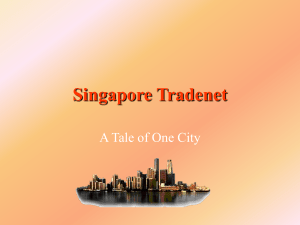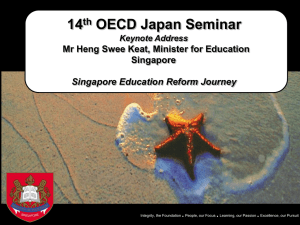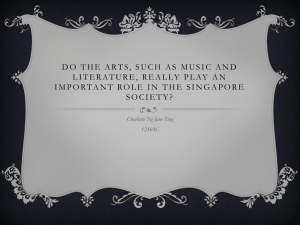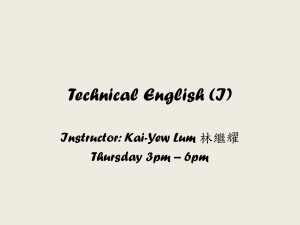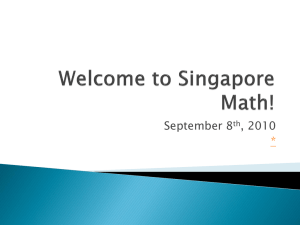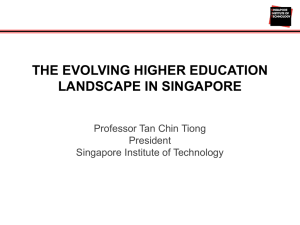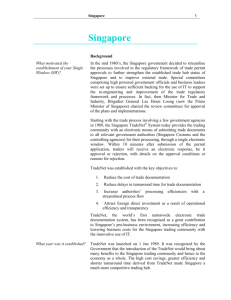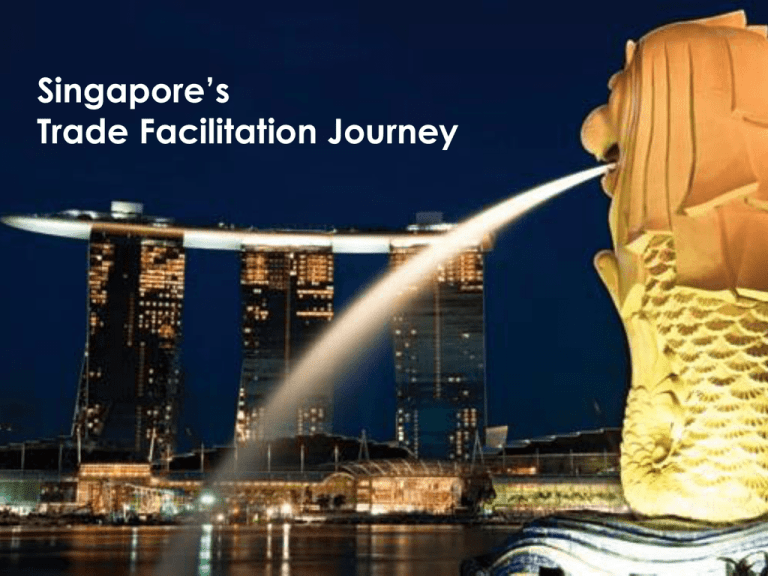
Singapore’s
Trade Facilitation Journey
Jonathan Koh Tat Tsen
Director,
Trade Facilitation Centre of Excellence
All rights reserved. ‘CrimsonLogic’ and the Shell Device are trade marks of CrimsonLogicPte Ltd. All information contained in this presentation is disclosed to you on the basis of a
prospective business relationship and is proprietary to CrimsonLogic Pte Ltd and may not be used, disclosed or reproduced without the prior written consent of CrimsonLogic.
Copyright 2010 Private & Confidential
1
Singapore’s Trade
Facilitation Journey
An integrated Trade Facilitation
Strategy for Greece
including Single Window
19-20 July 2012, Athens, Greece
Jonathan Koh Tat Tsen
Director,
Trade Facilitation Centre of Excellence
All rights reserved. ‘CrimsonLogic’ and the Shell Device are trade marks of CrimsonLogicPte Ltd. All information contained in this presentation is disclosed to you on the basis of a
prospective business relationship and is proprietary to CrimsonLogic Pte Ltd and may not be used, disclosed or reproduced without the prior written consent of CrimsonLogic.
Singapore has come a long way
since independence
Singapore Story
•
Singapore became independent in 1965 but faced many
challenges
• Limited resources (no natural resources, small population,
small capital)
• Limited market (small domestic market)
•
Singapore’s political leadership and public sector were instrumental
in overcoming these challenges
•
Singapore is now well-regarded as a successful developing nation in
the world, and has learnt much from >40 years of experience
Copyright 2009 Private & Confidential
Singapore has come a long way
since independence
•
Economy has grown substantially since independence
•
GDP per capita jumped by almost 100 times from US$512 in 1965 to
US$59,000 in 2011
•
Singapore was ranked by the World Economic Forum among the top
competitive economies in the world.
Per Capita GDP US$’000
2006 Per Capita
GDP = US$59,000
Copyright 2009 Private & Confidential
1965 Per Capita
GDP = US$512
Singapore’s Economy in Recession
Along the way, Singapore’s Economy Suffered Severe Recessions, e.g.
1985. An Economic Committee established to set new directions for
the Singapore economy reviewed the reasons for the recession and
recommended measures to cut costs, build up Singapore's
international competitiveness, alongside longer-term issues like wage
flexibility. The economic recovery came in 1986.
How Singapore’s Single Window - TradeNet®
Started
“Opportunities arise in times of crisis.
Singapore’s experience in establishing our single window initiative is a testimony to
this statement. In 1985, Singapore was hit by a recession. A high-level Economic
Committee convened at that time identified improvement in external trade as a
major goal and highlighted that use of IT could make a significant contribution to
Singapore’s long term competitive position. This report was an important mobilizing
factor to the realisation of Singapore’s single window, which was implemented in
1989 under the name of TradeNet. This was the world’s first nationwide electronic
single window.
After twenty years and many rounds of relentless upgrades,
TradeNet remains the key enabler of Singapore’s external trade,
which totals nearly 4 times our gross domestic product.”
- Extract fro Speech by Mrs Lim Hwee Hua, Minister, Prime Minister’s
Office, Second Minister For Finance And Transport
APEC Customs – Business Dialogue, 2009
Copyright 2009 Private & Confidential
Where it started ….
Then … mid 80s
involved multiple parties
required multiple agencies’
endorsement
About 10,000 declarations
daily in 1987
4-20 documents for each
import/export
all handled MANUALLY
Singapore Trade Facilitation Journey
In 1985 – Severe recession hits Singapore
Establishment of a high-powered Economic
Committee - chart new strategies to improve its
economic competitiveness.
Recommends - expedite the use of IT to improve
trade competitiveness.
In 1986, Hong Kong revealed that it was creating a
trade oriented EDI system called HotLine (now
TradeLink), which further strengthened Singapore’s
resolve to implement our own TradeNet.
The Trade Development Board (TDB),now
International Enterprise Singapore, was given the
task of mobilizing the trade community and
became the coordinating point among various
agencies such as Customs and Excise, Port of
Singapore Authority, and Civil Aviation Authority of
Singapore.
TradeNet – Beginnings
Justification :
•
Savings of S$1 billion (IBM survey)
Organisation Structure :
•
A TradeNet Steering Committee was created to oversee
the process in 1986
Political Will / Sponsor :
•
Dec 1986, then Minister of Trade & Industry – Mr Lee Hsien
Loong (now PM) publicly announced the TradeNet
project, to be completed in two years.
Actions
•
Jun 1987 – RFP Issued.
•
Mar 1988 - Singapore Network Services (now
CrimsonLogic) was created to own and operate the
TradeNet system
•
Jan 1989 – TradeNet was launched
•
TradeNet Initial Investments / Development was funded
by the Government – in excess of US$10M
Chronology of Implementation
Dec 1986
Formed Executive Committee led by Trade
Development Board (TDB)
Formed Project Committee led by National
Computerisation Board (NCB)
Feb 1987
Established 3 Working Groups for the sea, air and
government sectors
Mar 1988
Completed Technical Design Specifications
Incorporated SNS
Initiated Public Education Program
Oct 1988
Pilot/test run of TradeNet
Jan 1989
TradeNet went “Live”
TradeNet Steering Committee Structure
TradeNet Steering Committee
Sea Community
Sub-Committee
Air Community
Sub-Committee
Government
Sub-committee
Implementation Team
Integrated Procedures &
Business Processes
Proposal
Copyright 2009 Private & Confidential
Singapore TradeNet® ’s Approach
Single form
Single submission
Single interface
Single process
Singapore TradeNet - Overview
Since 1989 – One of world’s first nationwide trade
clearance system
Integrates 35 controlling units’ requirements
> 8000+ business rules
>12,000 users
9,000,000 trade declarations
over 90% processed in < 10 minutes
Copyright 2009 Private & Confidential
Copyright 2010 Private & Confidential
13
Singapore TradeNet
TradeNet® implemented in 1989
Integrates ALL 35 government authorities involved in
border clearance; One submission to multiple agencies
Integrated import, export and transshipment
documentation processing procedures.
Available 24/7 ; Facilitate electronic payments
Handles approx. 35,000 ~ 40,000 declarations per day, ~
12 million per year; >12,000 users
Processes 90% of declarations in <10 mins
> 8000+ business rules
Contributes to Singapore being ranked no. 1 by the World
Bank for “Trading Across Borders” and World Bank’s
“Logistics Performance Index”
Copyright 2009 Private & Confidential
Copyright 2012 Private & Confidential
14
Impact of TradeNet®
Before TradeNet
Processing
time/permit
2 – 7 days
After TradeNet
1 min or less
Fees charged
US$6 – US$13
approx. US$2.10
Number of
documents
4 – 20 docs
1 eForm/eDoc
Singapore’s TradeNet - The most studied national trade
facilitation system !
Harvard Business School – “TradeNet is the World’s First Nationwide Electronic Data Interchange
System”
IBM’s Robert M Howe “It is estimated that TradeNet saves Singapore traders around US$1
billion per year.”
McKinsey Quarterly “…Fill in one online form and receive the import or export license 15
seconds later …”
Awards - Received the Top eAsia award under the Trade Facilitation Category”
TradeNet® Integrates 35 Controlling Authorities
Singapore Civil
Defence Force
Singapore
Police
Force
Central
Narcotics
Bureau
Singapore
Customs
Ministry of
Manpower
International
Enterprise
Singapore
Ministry
of Health
Agri-Food &
Veterinary
Authority of
Singapore
Health
Sciences
Authority
Infocomm
Development
Authority of
Singapore
Media
Development
Authority
National Environment
Agency
Other Benefits of TradeNet®
Characteristics
Previous Manual process
TradeNet® Benefit
1. Submission of document
Via expensive dispatch
clerks/ couriers
Electronically from comforts
of office (or home)
2. Time of submission
Within office hours
Available 24 hrs
3. Trips per controlling
agency per document
At least 2 trips or more
NO trips required
4. Copies of document
Multiple copies
Single copy
5. Turnaround time for
approval
From 4 hours to 2-7 days
Within 10 mins
6. Dutiable goods handling
Separate documents for
customs processing
7. Controlled goods handling
8. Customs duties collection
Separate documents sent to
different controlling agencies
for processing
By cheque and cash
Same electronic document
routed to customs for
processing
Same electronic document
routed to controlling
agencies for processing
Automatic bank account
deduction
9. Trade Documentation Fee
S$10 per document
S$2.88 per application
Development, Evolution
and Operation of
TradeNet®
All rights reserved. ‘CrimsonLogic’ and the Shell Device are trade marks of CrimsonLogicPte Ltd. All information contained in this presentation is disclosed to you on the basis of a
prospective business relationship and is proprietary to CrimsonLogic Pte Ltd and may not be used, disclosed or reproduced without the prior written consent of CrimsonLogic.
TradeNet Development – 1989 to 2012
23 Years of Continuous Development
2012
2004
2002
2000
1999
1994
1989
1st
Implementation
Version 1.7
GST
Enhancement
Copyright 2009 Private & Confidential
Enhancement:
Y2k Compliance &
Version Upgrade
Planning for
right-sizing
CPC Codes
TradeNet 4.0 AHTN 2012
Major
Enhancements
2007
SEW
Right-sizing Cross-Border
Trade
Operating and Sustaining TradeNet
Singapore Network Services (now CrimsonLogic) was set up as a
“Special Purpose Vehicle”
Ownership –
55% - Trade Development Board (now IE Singapore)
45% - Statutory Boards related to info-comms
Port of Singapore Authority
Civil Aviation Authority
Singapore Telecoms
Operate as a “Valued Added Network” (VAN) operator
Allowed to charge a transaction fee to cover operating costs
under a concession from Government
SNS went to develop further nationwide community EDI networks
– MediNet, LawNet, BizNet, etc
CrimsonLogic’s International Track Record
Country
Project
Year
Business
Model
1
Singapore
TradeNet® / TradeXchange
1989
PPP
2
Mauritius
Mauritius TradeNet
1994
PPP
3
Ghana
Ghana Community Network
2002
PPP
4
Saudi Arabia
SaudiEDI
2002
PPP
5
6
7
Panama
Panama Canal Authority
Colon Free Trade Zone
Panama Customs
2004
2008
2009
Self Funded
Self-Funded
Self-Funded
8
Madagascar
Madagascar (GASYNET)
2007
PPP
9
India
Port Community System
2007
Self-Funded
10
Ivory Coast
Ivory Coast TradeNet
2008
PPP
11
Qatar
Qatar Customs Clearance Single
Window
2008
Self Funded
12
Trinidad & Tobago
Trinidad & Tobago
Single Electronic Window
2010
Self Funded
13
Mozambique
Mozambique TradeNet
2010
PPP
14
Chile
Chile Single Window
2012
Funded
Copyright 2012 Private & Confidential
21
Lessons from TradeNet® Experience
1.
TradeNet evolved into an idea to enhance Singapore’s global
competitiveness.
2.
TradeNet requires the cooperation of multiple government agencies
3.
Strong sponsor like the government was important.
4.
Requires new ideas and ways of doing business.
5.
An influential person to champion is a critical factor. TradeNet had two
influential champions.
6.
Carefully planned and coordinated publicity and educational effort was
instrumental to prepare the trading community to accept.
7.
The adoption is facilitated when the business community could see its value
immediately.
8.
The executive committee and the formation of SNS were important delivery
mechanisms in TradeNet’s success.
Source: Neo, B. S., “Managing New
Information Technologies: Lessons from
Singapore’s Experience with EDI”
Critical Success Factors
Defined goal and strategies
Reduce the cost of trade documentation
Reduce turnaround time for trade documentation
Streamline procedures
Simplify documentation
Standardize data and exploit IT
Singular lead agency – TDB
Creation of TradeNet Steering Committee
Detailed understanding of trade process
Negotiated to limit the number of forms from 20 to 1
Singular form was tested
Creation of Special Purpose Vehicle – Singapore
Network Services to develop & operate TradeNet
Trade Facilitation Value Drivers
Clearance
speed
Cost of trade
Security &
compliance
Productivity
Goals of Trade Facilitation
Beware of traffic lights !
Focus on your
directions ….Don’t
forget the goals !
Cheaper
• Less cost involved in
regulatory processes
Faster
• Less time to obtain
regulatory approval
Easier
• Less procedures to
deal with
Copyright 2012 Private & Confidential
25
Other Lessons …
Establishing a SW System Takes Time
This is much more than an IT project;
It also involves
deep integration of government
agencies in terms of policycoordination, work-processes, IT and
data standards
Alignment of policies & practices,
Building up knowledge & skills of
Customs & its staff
Mass adoption & support programs to
create awareness, skills, and buy-in
to use the new service
Thank you
for further information, contact:
All rights reserved. ‘CrimsonLogic’ and the Shell Device are trade marks of CrimsonLogicPte Ltd. All information contained in this presentation is disclosed to you on the basis of a
prospective business relationship and is proprietary to CrimsonLogic Pte Ltd and may not be used, disclosed or reproduced without the prior written consent of CrimsonLogic.

